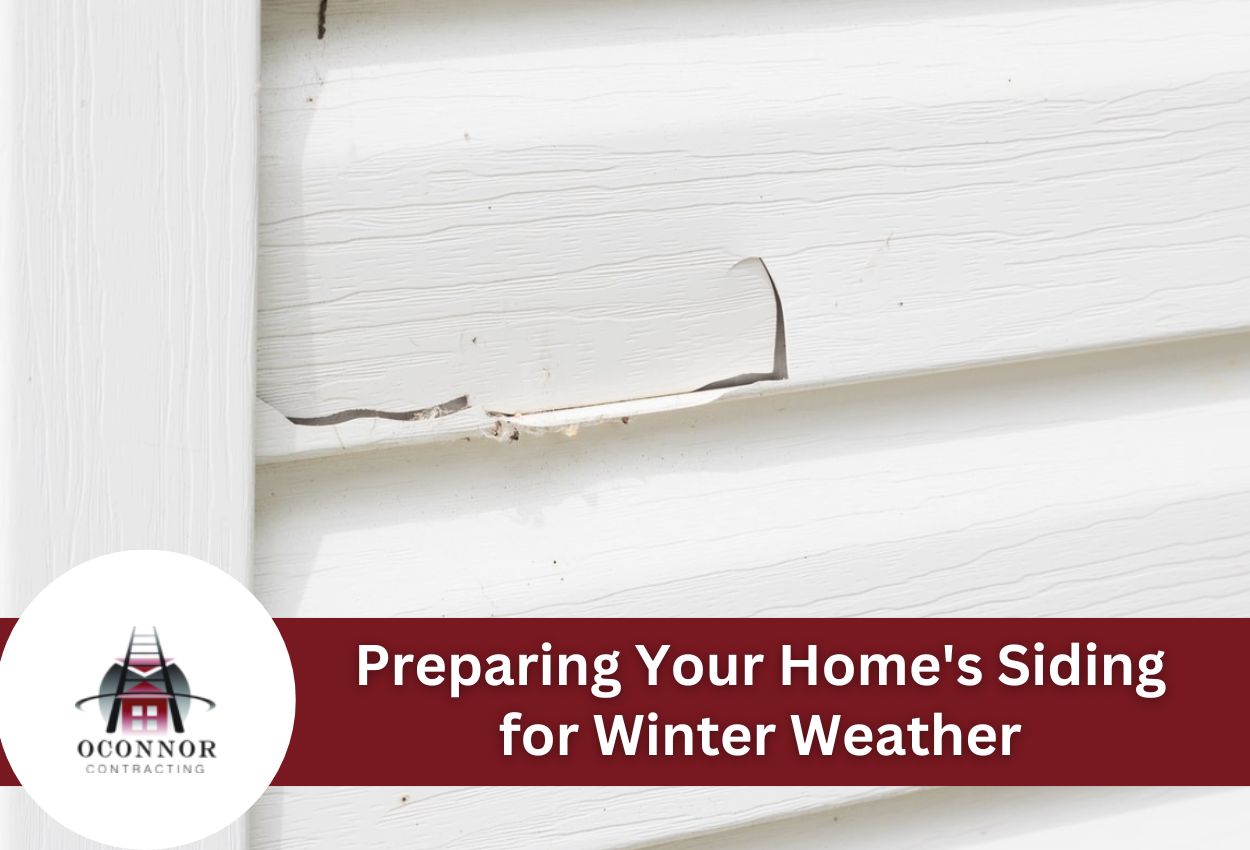
Thanks to their strength, lifespan, and visual appeal, metal roofs have always been a common choice among home and building owners. Nonetheless, insulation is a crucial component that many people neglect to think about. Maintaining adequate metal roof insulation in your home improves its energy efficiency while also lowering noise levels and improving comfort.
To assist your choice in the right insulation for your home, we will take a look at the top choices for metal roof insulation in this blog post.
Why Insulate A Metal Roof?
Rapid heat absorption and transfer is one of the particular difficulties that come with having a metal roof. Due to the air conditioning systems having to work more to ensure comfort, this may result in higher energy bills.
Condensation is another problem, particularly in areas with significant temperature variations. Moisture can accumulate when the warmer, humid air comes into contact with the colder metal surface. This can result in water damage, the formation of mold, and the roof structure deteriorating without enough insulation.
Benefits Of Insulating A Metal Roof
1. Reduce Heat Transfer
Insulation acts as a barrier, keeping your home cooler in summer and warmer in winter. This helps regulate indoor temperature, making your home more comfortable.
2. Energy Efficiency
With proper insulation, heating and cooling systems don’t need to work as hard, which can reduce energy bills over time.
3. Minimize Noise
Metal roofs can be noisy during rain or wind. Insulation dampens these sounds, making your home quieter and more peaceful.
4. Prevent Condensation
Insulation helps control moisture by preventing warm air from meeting cold metal. This reduces condensation and protects your home from mold, damage, and costly repairs.
Also Read: 7 Tips for Upgrading Your Poorly Insulated Attic Like a Pro
Types Of Insulation For Metal Roofs
1. Rigid Foam Board Insulation
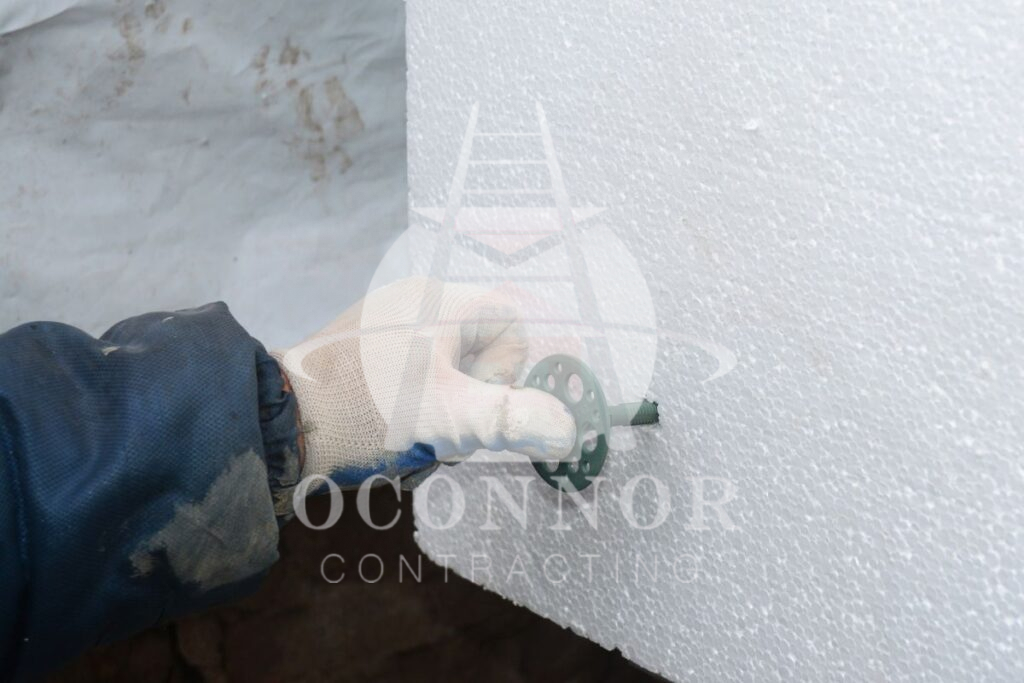
The first option is rigid foam board insulation, made from materials like polyiso, XPS, or EPS and typically installed on the roof’s exterior. It creates a continuous layer that reduces heat loss and protects against moisture. This metal roof insulation is popular because it’s durable and lightweight, though it can be expensive and raise environmental concerns.
| PROS | CONS |
| High R-Value: Provides excellent thermal resistance, keeping indoor temperatures stable | Higher Cost: More expensive than other insulation types |
| Moisture-Resistant: Helps prevent mold and mildew by resisting moisture | Specialized Installation: Requires professional help, adding to the cost |
| Durable: Resists damage from pests and environmental factors | Environmental Impact: Manufacturing can be less eco-friendly |
2. Fiberglass Batt Insulation
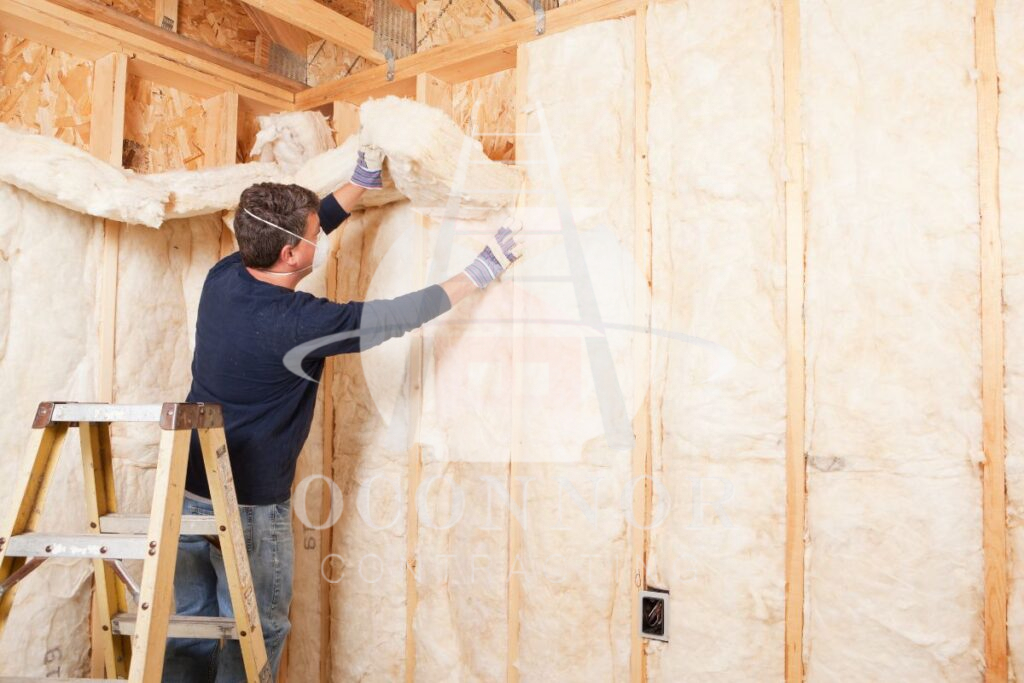
Another popular choice for homes is fiberglass batt insulation, which comes in pre-cut panels made of fiberglass fibers that fit between rafters or joists. It’s affordable and easy to install, making it a good option for roofing projects. However, it can settle over time, reducing its effectiveness. It also doesn’t provide an adequate barrier against air leaks, which might lead to energy loss.
| PROS | CONS |
| Affordable: One of the cheapest insulation options | Lower R-Value: Less effective thermal resistance compared to other types |
| Easy Installation: Comes in pre-cut sizes for straightforward installation | Can Settle: May require replacement or additional insulation as it settles |
| Readily Available: Commonly found in home improvement stores | No Air Sealing: Gaps can cause energy loss |
3. Spray Foam Insulation
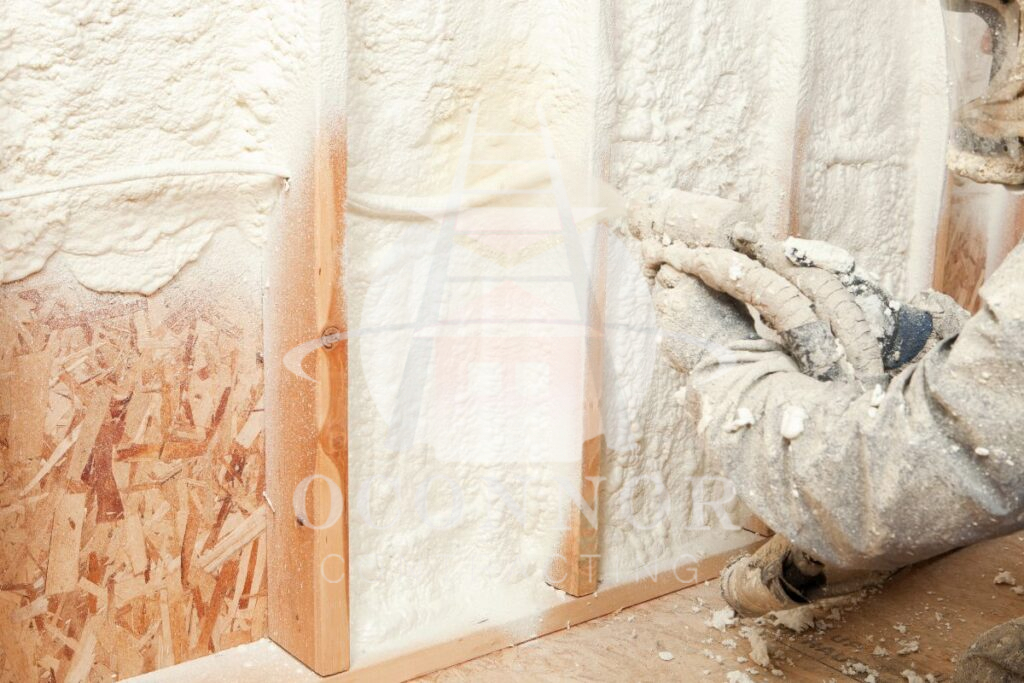
Spray foam insulation is highly effective, using a specialized mixture that expands to form a strong heat barrier. It creates an airtight seal, improving energy efficiency and reducing heating and cooling costs.
There are two types: open-cell foam, which is less dense and more affordable, but offers lower insulation, and closed-cell foam, which is denser, provides higher R-values, and adds structural strength. Despite its benefits, spray foam requires professional installation due to its complex application and potential health risks from chemical off-gassing.
| PROS | CONS |
| High R-value: Provides strong thermal resistance | Higher Cost: Significantly more expensive. |
| Air Sealing: Fills gaps and prevents air leaks | Specialized Installation: Needs professional application |
| Structural Strength: Adds support to the roof | Health Risks: Improper installation can release harmful chemicals |
4. Radiant Barrier Insulation
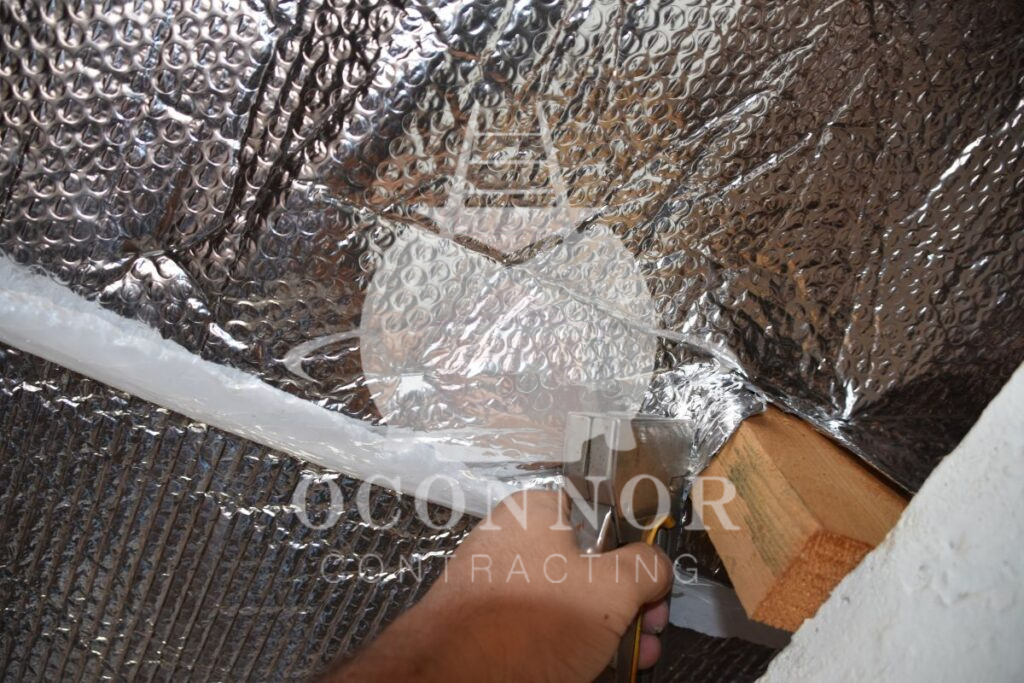
Radiant barrier insulation enhances the energy efficiency of metal roofs by using reflective aluminum foil applied to a backing such as paper plastic, or OSB. Installed with an air gap between the foil and the roof, it can reflect up to 97% of radiant heat, keeping indoor spaces cooler and cutting cooling costs by 5-10% in hot climates.
For best results, it should be installed horizontally between roof rafters with the reflective side facing an air space and kept dust-free. When used with a metal roof, it effectively reduces heat transfer into the home.
| PROS | CONS |
| Durable Coating: More robust than standard foil | Low R-Value: May not provide effective insulation |
| Blocks Radiant Heat: Helps keep homes cooler | Hot Climate Only: Less effective in cooler climates |
| Inexpensive: An affordable option | Moisture Damage: Can be compromised by moisture |
5. Loose-Fill Insulation
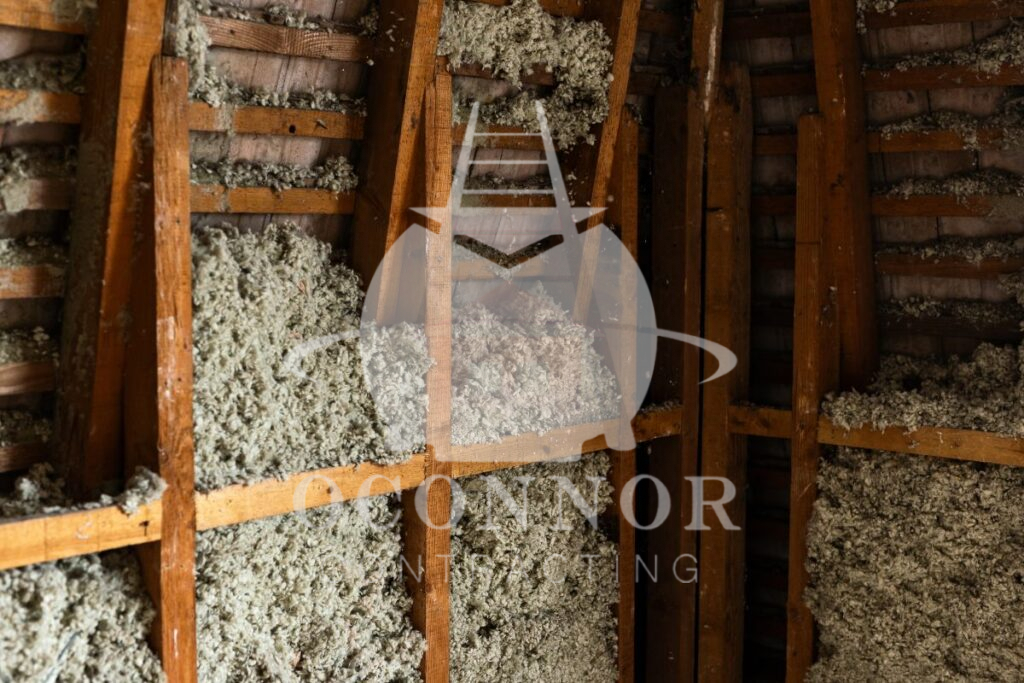
The last option is loose-fill insulation, made from materials like cellulose or fiberglass. It is a versatile option for metal roofs and it effectively fills irregular spaces and gaps, providing uniform thermal protection.
Installed by blowing the material into place, it’s great for tight or hard-to-reach areas. Loose-fill metal roof insulation tends to offer R-values between R-2.2 and R-3.8 per inch, with cellulose generally having better thermal resistance than fiberglass. This type is ideal for retrofitting existing structures or adding insulation to finished areas due to its easy installation and adaptability.
| PROS | CONS |
| Fills Cavities: Good for irregular spaces | Can Settle: May need additional insulation added over time |
| Moderate R-value: Provides decent thermal resistance | Lower R-value: Not as effective as rigid foam board |
| Affordable: Generally cheaper than rigid foam or spray foam | No Air Sealing: Gaps can cause energy loss |
How To Choose The Right Insulation
With so many options it can feel intimidating to pick the right choice for your roof, so here are some things to keep in mind.
1. Climate
Choose insulation based on your area’s heating and cooling needs. For example, a radiant barrier will be more effective for hot climates while spray foam insulation is best for cold ones.
2. Budget
Balance initial costs with long-term savings. Consider how some types of insulation will save you more money on energy bills but may cost more upfront.
3. R-Value
Higher R-values mean better insulation. Select a choice based on the local climate and the recommended levels for your area. Your local building codes may outline the right type of R-value for your roof.
4. Type of Insulation Material
Different materials offer varying benefits. Take into account their cost, effectiveness, and moisture resistance.
5. Installation Method
Factor in how easy a material is to install and whether professional help is needed for the best results.
6. Longevity and Maintenance
Choose durable insulation that maintains effectiveness over time and requires minimal upkeep.
How Thick Should The Insulation Be For A Metal Roof?
Generally, the higher the R-value on an insulation material, the thicker the material will be. However, there isn’t generally a one-set answer for how thick metal roof insulation should be. The right thickness depends on your local climate, energy goals, and building needs, so choose accordingly.
Find Quality Roofing Services With The Team At OConnor Contracting
Now that you know that proper metal roof insulation is a smart investment for lower energy bills, improved comfort, and a more eco-friendly home. Consult a qualified professional for personalized advice to ensure you choose the best insulation for your metal roof. Enjoy long-term benefits with a more comfortable, energy-efficient, and sustainable home.
Want to improve the comfort of your metal roof? OConnor Contracting specializes in customized metal roofing services to fit your climate and needs. Our expert team will help you control interior temperatures while adding value to your home. Contact us today at (716) 600-7663 to learn more.


